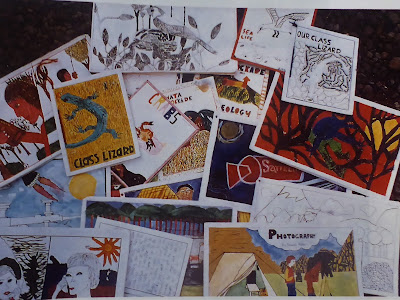By Allan Alach
Every week Bruce Hammonds and I collect articles to share with teachers to encourage a creative approach to teaching and learning. I welcome suggested articles, so if you come across a gem, email it to me at allanalach@inspire.net.nz
Looking back to the past - or ideas for the future? The Taranaki Environmental Approach of the 1970s
Bruce's latest article:
 'We all learn from interacting with our environment. The classroom is not only part of the child's environment but is a base from which to explore it. From this base we can focus attention, develop new interests and extend learning skills. Every attempt should be made to develop the classroom as a challenging environment which encourages children to grow in ways appropriate to tthem. In our experience an integrated curriculum is a prime necessity’..
'We all learn from interacting with our environment. The classroom is not only part of the child's environment but is a base from which to explore it. From this base we can focus attention, develop new interests and extend learning skills. Every attempt should be made to develop the classroom as a challenging environment which encourages children to grow in ways appropriate to tthem. In our experience an integrated curriculum is a prime necessity’..it reports such large effect sizes. My colleague, Marta Pellegrini from the University of Florence (Italy),
helped me track down the evidence behind Hattie’s claims. And sure enough, Hattie is profoundly wrong. He is merely shoveling meta-analyses containing massive bias into meta-meta-analyses that
reflect the same biases.’
More than just a tantrum: here’s what to do if your child has oppositional defiant disorder
‘ODD is a pattern of disobedient, hostile, and defiant behaviour directed towards authority figures. Children with ODD rebel, are stubborn, argue with adults, and refuse to obey. They have anger outbursts and a hard time controlling their temper. ODD can negatively impact a young person’s educational options as they struggle to adapt and conform to rule-based school structures.’
'Helicopter Parenting' Linked To Behavioural Problems In Children, Finds Research
“Children who cannot regulate their emotions and behaviour effectively are more likely to act out in the classroom, to have a harder time making friends and to struggle in school.”’
The Difference Between Being Busy and Being Productive
Useful advice on these crazy days of ever increasing teacher workloads.
‘When I made the leap and decided to “break up with busy,” I noticed something happening. I actually became a better teacher. After the difficult conversation with my wife, I remember thinking that I would be making sacrifices as an educator. However, that’s not what happened. I actually had more time, more energy, and more mental bandwidth to create epic projects for students. It turns out that I was more productive when I was able to rest.’
Contributed by Bruce Hammonds:
At NZ's first bush school, kids play with knives, eat possums and are free to roam
‘Auckland University of Technology professor Nesta Devine, who researches educational philosophy and pedagogy, says the 'forest school' movement has been around since the end of the 18th century. The teaching philosophy first emerged as a "reaction against the values of industrialism, both in terms of its focus on money and reducing human relationships to financial ones, and to its abuse of the natural world”'.
Also:
Forest School a 'safe haven' for struggling students
‘A year on from its launch, and The Forest School is blooming.
Hidden away from the road in the bush north of Hatfields Beach, the 'free range' school offers alternative education one day a week for students up to 14-years-old.’
Off the Record: The days of JUST ‘chalk and talk’ are past
‘Yes I know writing things out helps you process the information, but here’s the thing…working
collaboratively to discover that information for yourself as a student ALSO helps you process it and is way less boring than copying from the board! And much more satisfying. And yes, it takes a bit of organising – but it’s worth it! Aren’t we all looking to have active and engaged rather than passive learners?’
collaboratively to discover that information for yourself as a student ALSO helps you process it and is way less boring than copying from the board! And much more satisfying. And yes, it takes a bit of organising – but it’s worth it! Aren’t we all looking to have active and engaged rather than passive learners?’
Numeracy crisis in New Zealand
‘Maths trauma in teachers and parents contributes to the difficulty in learning and teaching mathematics. It is estimated that one third of primary school teachers suffer from maths trauma. It is NOT their fault. They themselves are the product of a cycle that perpetuates maths trauma and antipathy.’
Attention, Students: Put Your Laptops Away
‘As laptops become smaller and more ubiquitous, and with the advent of tablets, the idea of taking notes by hand just seems old-fashioned to many students today. Typing your notes is faster — which comes in handy when there's a lot of information to take down. But it turns out there are still advantages to doing things the old-fashioned way.’
From Bruce’s ‘goldie oldies’ file:
What the modern world has forgotten about children and teaching....and solutions to ensure all students learn
“Modern Western learning and teaching based on 'collecting data on human learning of children's behaviour in school is like collecting data on killer whales based on their behaviour at Sea World.’"
Transforming education: Stop teaching and begin learning with your students
‘It seems counter-intuitive but students are failing because teachers are teaching too well.Teachers
spend hours and hours of their time preparing lessons for their students but all too often the only person learning anything are the teachers themselves. Even the most attentive and compliant of students do not get what the teachers intend – and worse still researchers have shown that that such teaching does not change students’ minds – and changing minds is the definition of learning.’



































